October 12th, 2023 by Angela Archer
Located in Washington, D.C., the Sea Grant Knauss Fellowship provides a unique educational and professional experience to graduate students who have an interest in ocean, coastal and Great Lakes resources, and in the national policy decisions affecting those resources. This is a one-year fellowship open to any student, regardless of citizenship, who is enrolled toward a degree in a graduate or professional program on the day of the deadline.
The application deadline for the Knauss Fellowship is February 15, 2024. Please contact Angela Archer, amcbride@purdue.edu, before submitting an application. This is to ensure that candidates understand the expectations of the fellowship and that every application has all required materials.
Students enrolled at an Illinois or Indiana university or college should submit their applications through Illinois-Indiana Sea Grant (IISG) by emailing Angela Archer at amcbride@purdue.edu. Students in surrounding states without a Sea Grant program should contact the National Sea Grant College Program at oar.sg.fellows@noaa.gov for a referral.
For more information about this fellowship, other opportunities and application requirements, visit the IISG fellowship page.
Illinois-Indiana Sea Grant is a partnership between NOAA, University of Illinois Extension, and Purdue University Forestry and Natural Resources, bringing science together with communities for solutions that work. Sea Grant is a network of 34 science, education and outreach programs located in every coastal and Great Lakes state, Lake Champlain, Puerto Rico and Guam.
November 30th, 2022 by Angela Archer
The National Oceanic and Atmospheric Administration (NOAA), National Sea Grant Office, and Illinois-Indiana Sea Grant are pleased to announce the fellows for the 2023 class of the John A. Knauss Marine Policy Fellowship program. Since 1979, the National Sea Grant College Program has provided one-year fellowships working in federal government offices in Washington, D.C. to over 1,300 early-career professionals. The 86 finalists, including two sponsored by Illinois-Indiana Sea Grant, in the 2022 class represent 29 of the 34 Sea Grant programs and 62 universities.
“The Knauss Fellowship offers graduate students the invaluable opportunity to put their academic knowledge to practice in tackling marine, coastal, and Great Lakes management and policy challenges at the federal level,” said Jonathan Pennock, Ph.D., National Sea Grant College Program director. “We look forward to welcoming the 2023 class of Knauss fellows and seeing how they will apply their unique insights to developing solutions to some of the most important challenges facing the country.”
Illinois-Indiana Sea Grant’s sponsored fellows for 2023 are Hannah Lohman, Hannah Staley and Audrey Taylor.
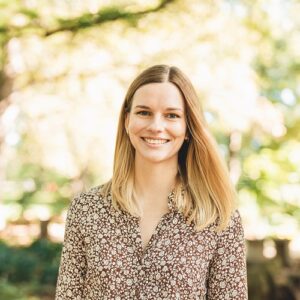 Hannah Lohman received a bachelor’s degree in civil engineering and a master’s degree in environmental engineering from the University of Illinois Urbana-Champaign (UIUC). She is now working toward a doctorate in environmental engineering with a focus on energy, water, environment and sustainability at UIUC and has completed a Certificate of Excellence in Sustainable Management and Technology from the UIUC Gies College of Business. Currently, she works as a research assistant in the Department of Civil and Environmental Engineering and has served numerous leadership roles in the Graduate Society of Women Engineers (SWE). Earlier this year, she was awarded the Outstanding Collegiate Member Award for her dedication and commitment to SWE.
Hannah Lohman received a bachelor’s degree in civil engineering and a master’s degree in environmental engineering from the University of Illinois Urbana-Champaign (UIUC). She is now working toward a doctorate in environmental engineering with a focus on energy, water, environment and sustainability at UIUC and has completed a Certificate of Excellence in Sustainable Management and Technology from the UIUC Gies College of Business. Currently, she works as a research assistant in the Department of Civil and Environmental Engineering and has served numerous leadership roles in the Graduate Society of Women Engineers (SWE). Earlier this year, she was awarded the Outstanding Collegiate Member Award for her dedication and commitment to SWE.
Lohman studies the sustainability decision-making for engineered water and wastewater projects in resource-limited and low-income communities. Her research interests include quantifying decision-making metrics including economics and environmental/health impacts, evaluating stakeholder and community needs, meeting global sustainability goals with circular economics and innovative solutions, and collaborating across disciplines. She has a strong passion for working in marginalized communities and has worked on projects internationally in Honduras, Rwanda, Uganda and India. As a Knauss fellow, Hannah will be working in the NOAA OAR Climate Program Office with the Climate Adaptation Partnerships team. She looks forward to being a key part of the program’s efforts to expand society’s regional capacity to adapt to climate impacts in the U.S., and to learn more about climate adaptation decision-making in marginalized communities.
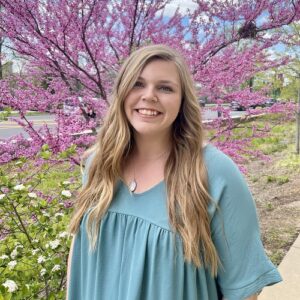 Hannah Staley received a bachelor’s degree in marine science with minors in environmental science and political science from Coastal Carolina University. She is currently a third-year master’s candidate enhancing her public policy skills and broadening her scientific understanding of the environment by pursuing a dual master’s degree in Environmental Science and Public Affairs at the Indiana University (IU) O’Neill School of Public and Environmental Affairs. With a concentration in Environmental Policy and Natural Resource Management, Hannah has shaped her curriculum to focus on climate change mitigation, environmental policy and environmental justice. Outside of the classroom, she worked for the City of Huntington, Ind., where she successfully wrote a grant to fund an arboretum and initiate their climate action plan by conducting local government and community-wide greenhouse gas inventories. She then continued to lead climate initiatives in Indiana as the Project and Outreach Coordinator for the McKinney Climate Fellows Program at IU’s Environmental Resilience Institute.
Hannah Staley received a bachelor’s degree in marine science with minors in environmental science and political science from Coastal Carolina University. She is currently a third-year master’s candidate enhancing her public policy skills and broadening her scientific understanding of the environment by pursuing a dual master’s degree in Environmental Science and Public Affairs at the Indiana University (IU) O’Neill School of Public and Environmental Affairs. With a concentration in Environmental Policy and Natural Resource Management, Hannah has shaped her curriculum to focus on climate change mitigation, environmental policy and environmental justice. Outside of the classroom, she worked for the City of Huntington, Ind., where she successfully wrote a grant to fund an arboretum and initiate their climate action plan by conducting local government and community-wide greenhouse gas inventories. She then continued to lead climate initiatives in Indiana as the Project and Outreach Coordinator for the McKinney Climate Fellows Program at IU’s Environmental Resilience Institute.
Hannah is excited to take this next step in her career after she graduates in December. A career goal of hers has always been to work on marine and environmental issues, as well as climate change at the federal level. She is thrilled to be able to achieve this goal by working in NOAA’s Office of Marine and Aviation Operations as a Knauss Marine Policy Fellow this next year. This position will provide Hannah with the opportunity to utilize her scientific and policy skills by working in the intersection between the executive and legislative branch, while also learning about NOAA’s ships and planes.
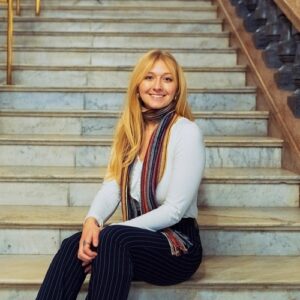 Audrey Taylor recently finished her Ph.D. in Earth Sciences at the University of Notre Dame’s Department of Civil and Environmental Engineering and Earth Sciences. Her doctoral research and her undergraduate degree at University of North Carolina Wilmington focused on understanding climates and environments through both space and time. Audrey’s work ranged from reconstructing changes in rainfall and temperature in southeastern Africa millions of years ago, to documenting the aquatic communities in a Greek lagoon during the early 20th century. Moving forward, she hopes to use the Knauss fellowship as an opportunity to communicate climate change science and advocate for sustainable policies that benefit the climate, environment and people alike.
Audrey Taylor recently finished her Ph.D. in Earth Sciences at the University of Notre Dame’s Department of Civil and Environmental Engineering and Earth Sciences. Her doctoral research and her undergraduate degree at University of North Carolina Wilmington focused on understanding climates and environments through both space and time. Audrey’s work ranged from reconstructing changes in rainfall and temperature in southeastern Africa millions of years ago, to documenting the aquatic communities in a Greek lagoon during the early 20th century. Moving forward, she hopes to use the Knauss fellowship as an opportunity to communicate climate change science and advocate for sustainable policies that benefit the climate, environment and people alike.
As the International Relations and Policy Fellow with the Bureau of Ocean Energy Management (BOEM), Audrey will be learning and engaging in domestic and foreign policy discussions. Her work in the office will likely focus on climate, carbon sequestration and offshore wind energy. Audrey says this portfolio presents a great opportunity to apply her climate expertise and diversify her knowledge.
Curious about the Knauss fellowship? The Knauss blog features stories from former Knauss cohorts, sharing insights on fellowship experiences and their journeys to D.C. Students enrolled in education institutions in Illinois and Indiana should apply for the fellowship through Illinois-Indiana Sea Grant (IISG). Information about the Knauss fellowship and other graduate student opportunities can be found on IISG’s fellowships page and also by contacting Angela Archer, campus engagement coordinator, at amcbride@purdue.edu or 765-496-3722.
Illinois-Indiana Sea Grant is a partnership between NOAA, University of Illinois Extension, and Purdue University Forestry and Natural Resources, bringing science together with communities for solutions that work. Sea Grant is a network of 34 science, education and outreach programs located in every coastal and Great Lakes state, Lake Champlain, Puerto Rico and Guam.
Contact: Angela Archer
September 11th, 2019 by IISG
Emma Young’s staring down a deadline these days as she wraps up her research and types away at her dissertation.
To be fair, it’s self-imposed. The biology doctoral candidate at the University of Missouri–St. Louis is aiming to be ready to defend her work exploring parasite dynamics in an assemblage of neotropical birds in Gamboa, Panama, before the end of the semester.
“It’s hard for me to imagine something stopping me,” Young said confidently.
She already has plans for the new year, and the last thing she wants is the dissertation still hanging over her.
Young will be relocating to Washington, D.C., where, come February, she’ll begin work as an executive fellow through the National Oceanic and Atmospheric Administration and Sea Grant John A. Knauss Marine Policy Fellowship Program.
The program provides educational and professional experience for graduate students who have an interest in ocean, coastal and Great Lakes resources and in the national policy decisions affecting them through a one-year paid fellowship with a host in either the legislative or executive branch.
Young, who was nominated by Illinois-Indiana Sea Grant, is the first to admit those parameters make her an unusual fit among the 69 finalists selected for the 2020 class.
“There isn’t really a big aquatic component to my research,” Young said. “I felt like this odd duck coming into this policy program. A lot of people I know who have had this fellowship, you see pictures of them standing on boats holding fish or they’re wearing waders out in wetlands, stuff like that.”
But any concerns she might have had about being out of her habitat were put to rest after conversations with people she knows who have gone through the program. All the fellows are likely to be navigating new terrain from their graduate research – and on land.
“A lot of what I’m going to be doing is taking a large breadth of scientific topics and distilling it down for legislators or for members of the public or some combination thereof,” Young said. “I love doing that. That’s my favorite thing.”
Read the full story on the University of Missouri-St. Louis website.
Writer: Steve Walentik, UMSL Daily
July 25th, 2019 by IISG
The National Oceanic and Atmospheric Administration (NOAA) and the National Sea Grant Office are pleased to announce the finalists for the 2020 class of the John A. Knauss Marine Policy Fellowship program. Since 1979, the National Sea Grant College Program has provided one-year fellowships working in federal government offices in Washington, D.C. to over 1,300 early-career professionals. The 69 finalists, including two sponsored by Illinois-Indiana Sea Grant, in the 2020 class represent 27 of the 34 Sea Grant programs.
“With each year and class, we continue to be more impressed with the Sea Grant Knauss fellows. They bring fresh perspectives and experiences to the coastal and marine science and policy work happening in D.C., and they continue to raise the bar for us all,” said Jonathan Pennock, National Sea Grant College Program Director. “Congratulations to the 2020 Knauss finalists!”
Illinois-Indiana Sea Grant’s sponsored finalists are Meredith Richardson and Emma Young.
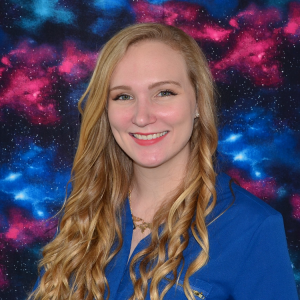
Meredith Richardson
Meredith Richardson received a bachelor’s degree in civil engineering with a minor in music from North Carolina State University and played on the women’s volleyball team during her undergraduate career. She has since completed a master’s in civil and environmental engineering from University of Illinois at Urbana-Champaign (UIUC), and is now working toward a doctorate in civil and environmental engineering at UIUC. Richardson works as a research assistant in the Department of Civil and Environmental Engineering and as a head coach at Primetime Volleyball Club. Earlier this year, she was an Illinois Section Nominee for the Outstanding Collegiate Award from the Society of Women Engineers.
“I’m a fourth-year PhD student at UIUC in the Water Resources Engineering & Science program,” said Richardson. “My research interests revolve around modeling and systems analysis in the areas of critical zone science, hydrology, ecosystem dynamics, human influence and environmental economics. After graduation, I would love to work at the intersection of research outcomes and societal needs. I strive for a career that provides leadership in environmental policy and opportunity to shape policy development and future research directions at the national level.”
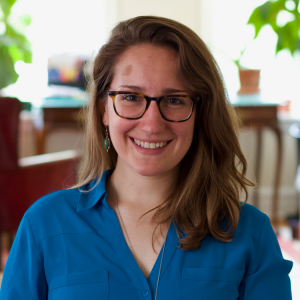
Emma Young
Emma Young received a bachelor’s degree with honors in biology from Vassar College in Poughkeepsie, New York. She is now working on a doctorate in biology from the University of Missouri–St. Louis and has completed a graduate certificate in global biodiversity and leadership. Young works as an avian stewardship plan coordinator for the Audubon Center at Riverlands & U.S. Army Corps of Engineers, and she is a producer and host of The Story Collider Podcast. She also founded Science Distilled, a monthly happy hour and public lecture series in St. Louis.
Young studies avian malaria parasites, host and parasite interactions in the neotropical birds of Panama, and the roles that climate and habitat play in malaria infection. “I’m really excited to get the opportunity to delve into policy and marine science,” she said. “I’m an ornithologist and disease ecologist by training, and my dissertation involves everything from rainfall patterns to avian social habits—I love learning new things and broadening my understanding of the natural world! But what I care about more than anything else is doing science that can be used and shared; this can mean conserving habitats and species while also enhancing quality of life for the people who interact with those same systems. I hope that my experience in the Knauss fellowship helps me learn how to do that to the best of my ability, so I can continue to connect folks to the science going on around them every day.”
Knauss finalists are chosen through a competitive process that includes several rounds of review at both the state Sea Grant program and national levels. Students finishing Masters, Juris Doctor, and Doctor of Philosophy programs with a focus and/or interest in marine science, policy or management apply to one of the 33 Sea Grant programs. If applicants are successful at the state program level, their applications are then reviewed by a national panel of experts. This fall, the 2020 finalists will travel to Washington, D.C., to interview with several executive or legislative offices. Following placement, they will begin their fellowship in February 2020.
Executive appointments for the 2019 Knauss fellows included placements throughout the National Oceanic and Atmospheric Administration as well as with Department of the Interior, National Science Foundation, U.S. Navy, and other agencies. Legislative placements included the Senate Committee on Environment and Public Works (Minority), the House Committee on Transportation and Infrastructure (Majority), the Senate Commerce Committee (Majority and Minority), the House Committee on Natural Resources (Minority), and several placements in both majority and minority offices.
The 2020 Knauss finalists will become the 41st class of the fellowship and will join a group of over 1,300 professionals who have received hands-on experiences transferring science to policy and management through one-year appointments with federal government offices in Washington, D.C.
Curious about the Knauss fellowship? The Knauss blog shares stories from the 2019 Knauss class on fellowship experiences and their journeys to D.C.
Placement of 2020 Knauss finalists as fellows is contingent on adequate funding in Fiscal Year 2020.
Writers: Brooke Carney; Hope Charters
Contact: Angela Archer
December 18th, 2018 by IISG
If you are a graduate student interested in combining your education and experience with policy, marine sciences or coastal community resiliency, consider applying for one, or even two, of these fellowships. The opportunities below are open to graduate students enrolled in a master’s or doctorate program. For more information, please visit our Fellowships page or contact Angela Archer at amcbride@purdue.edu or (765)496-3722.
John A. Knauss Fellowship
The Knauss fellowship provides a unique educational experience to students who have an interest in ocean, coastal and Great Lakes resources and in the national policy decisions affecting those resources. The program matches highly qualified graduate students with “hosts” in the legislative and executive branches of government located in the Washington, D.C. area for a one year paid fellowship.
NOAA Coastal Management Fellowship
The Coastal Management Fellowship was established to provide on-the-job education and training opportunities in coastal resource management and policy for postgraduate students and to provide project assistance to state coastal zone management programs. The program matches postgraduate students with state coastal zone programs to work on projects proposed by the state.
National Marine Fisheries Service Fellowships
These fellowships are aimed at Ph.D. candidates, who are United States citizens, interested in the population dynamics of living marine resources and the development and implementation of quantitative methods for assessing their status. The marine resource economics fellowship concentrates on the conservation and management of marine resources.
February 28th, 2018 by Sea Grant
Last year, Denise Devotta was selected as a John A. Knauss Fellow, an opportunity for a unique educational experience for students interested in national policy decisions affecting ocean, coastal and Great Lakes resources. Representing Illinois-Indiana Sea Grant, this University of Illinois graduate student was matched with a host in the Washington, D.C. area for a one-year paid fellowship. Here she reflects on her experiences.
The past year has been an adventure of a lifetime. My placement as a Knauss fellow in Congressman Jared Huffman’s office gave me firsthand experience of the ways in which the U.S. Congress creates and determines science policy. During my time there, I introduced seven pieces of legislation on Congressman Huffman’s behalf, drafted statements and questions for him for 46 Congressional hearings and five times when he spoke on the Floor of the U.S. House of Representatives (more commonly known as ‘the Floor’). I created vote recommendations for him, covering 47 pieces of environmental legislation. I met over 70 individual constituents, delegates from federal and state agencies, and representatives from non-profit organizations (including NOAA, the California Department of Forestry and Fire Protection, and the World Wildlife Fund) to discuss legislation pertaining to natural resource management in different parts of the country.
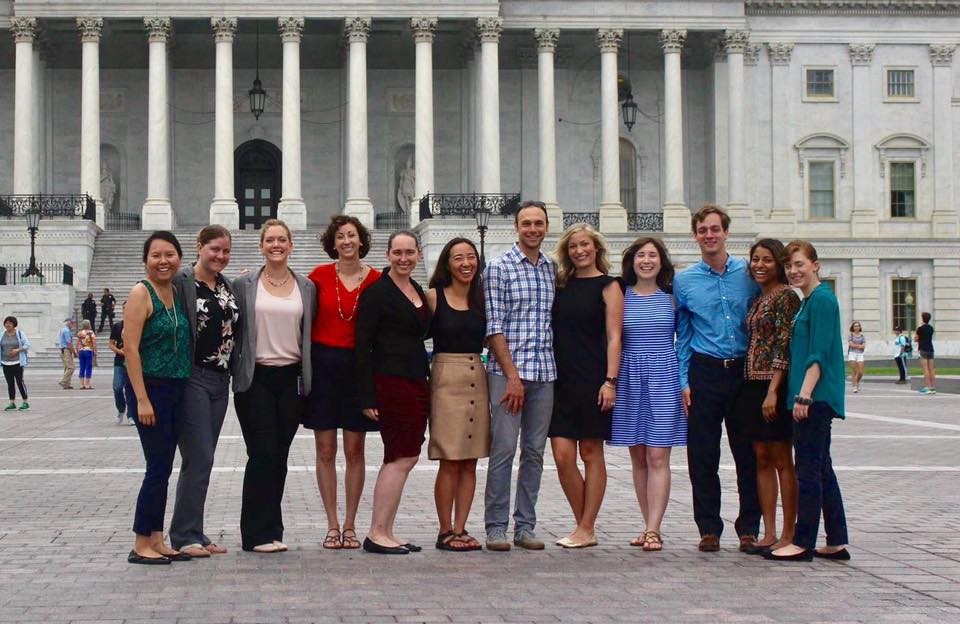
Denise Devotta (second from right) with the other 2017 Knauss fellows placed in Congressional offices, on the grounds of the U.S. Capitol in Washington, D.C.
Of all these incredible experiences, my favorites include staffing Congressman Huffman at Congressional hearings and on the Floor. Because Congressman Huffman is the most powerful Democrat on the Water, Power and Oceans Subcommittee, I helped draft his talking points and questions for witnesses at Congressional hearings on key pieces of legislation affecting oceans, fisheries and freshwater management nation-wide. Being Congressman Huffman’s primary staffer during debates on the National Marine Sanctuaries Act and the reauthorization of the Magnuson-Stevens Act were particularly thrilling. Staffing Congressman Huffman when he discussed legislation on the Floor involved similar responsibilities. The main difference stemmed from the types of points and questions I included in Congressman Huffman’s statement. These were more closely tailored toward issues that other Members of Congress were likely to raise during the debate on the Floor.
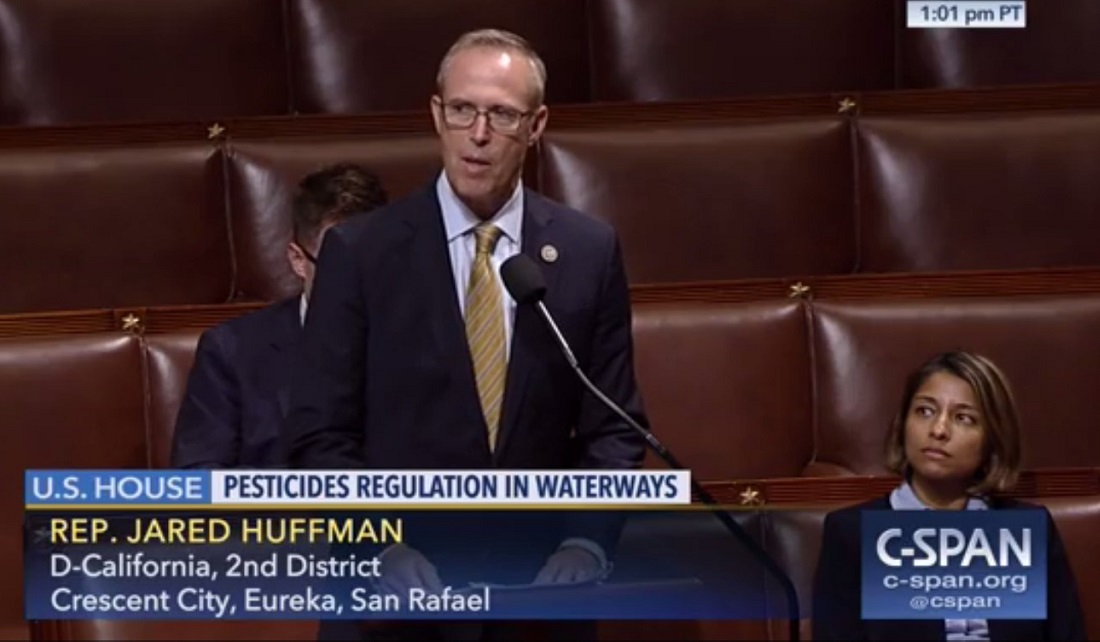
Denise Devotta (right) staffing Congressman Huffman on the Floor of the U.S. House of Representatives as he debated legislation concerning pesticide regulation in waterways.
Another highlight during my Knauss Fellowship year was visiting my boss’s beautiful district in Northern California in August 2017. I spent about two weeks travelling from San Francisco in the south to Eureka in the north, and I met with my boss’s constituents along the way to learn more about important natural resource management issues they were facing. Some of these issues included water management in the vineyards of Sonoma County, ocean acidification impacting oyster growing operations at Hog Island Oyster Company and forest fire issues in the Trinity Alps. In addition to this trip, the Knauss Fellowship funded my engagement in other professional development activities, including completing my PhD dissertation at the University of Illinois at Urbana-Champaign in Urbana, Illinois, attending the Ecological Society of America’s Annual Meeting in Portland, Oregon, and presenting at the University of Maryland Center for Environmental Science in Frostburg, Maryland.
My Fellowship has ended, but I am excited about starting work as a scientist for NOAA’s Coral Reef Watch Program in March 2018. Being a Knauss fellow in Congress has provided me with an invaluable network of contacts in science policy and research, and it has given me a rare skillset valuable to both fields. I am extremely grateful to NOAA’s Sea Grant program for giving me this opportunity, and strongly encourage eligible graduate and professional students to apply for the 2019 Fellowship class.
January 17th, 2017 by IISG
August to November of my John A. Knauss Marine Policy Fellowship was non-stop. I have been learning about international fisheries policy in my placement within NOAA National Marine Fisheries Service, Office of International Affairs and Seafood Inspection Program all year and it was time to see it in action. My travels took me to five countries on three continents for five, very different international meetings.
Using the professional development funds provided by the fellowship, I traveled to Kuala Lumpur, Malaysia in August for the 34th meeting of the Scientific Committee on Antarctic Research (SCAR). The conference was directly related to my doctoral thesis work and also tied in with work that NOAA Fisheries does in the Southern Ocean on the United States delegation to the Commission for the Conservation of Antarctic Marine Living Resources (CCAMLR). Many scientists from other nations’ delegations were also present at the SCAR meeting and it was an incredible opportunity to meet international Antarctic researchers, many of whom I would see two months later in Hobart, Tasmania for the 35th meeting of CCAMLR.
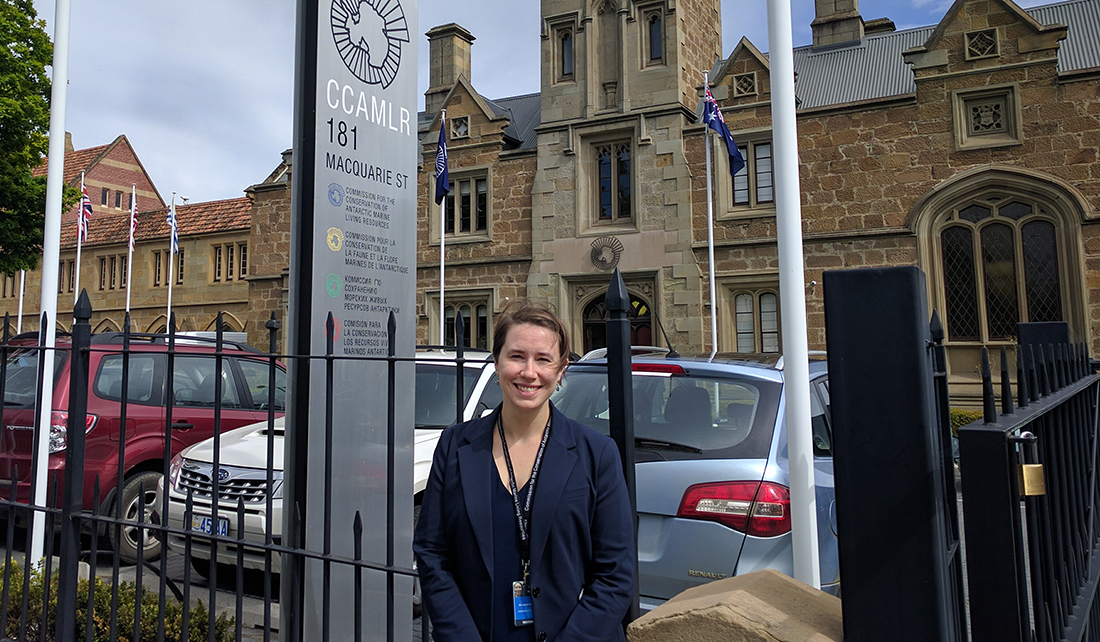
Lauren in Tasmania, Australia at Commission for the Conservation of Antarctic Marine Living Resources (CCAMLR).
I thought central Illinois and Washington, D.C., were hot and humid during August and that I was well prepared for August in Kuala Lumpur. It turns out that a few higher percentage points of humidity make a huge difference in comfort level. Thankfully my hotel was connected to the convention center, meaning trips outside could be planned strategically. I was also fortunate to be staying at the same hotel as the U.S. delegation to SCAR and they welcomed me into their morning breakfast meetings to learn more about the inner workings of the conference organization.
The conference itself was not only a great way to keep up on the current research in my field of fish physiology but also learn about areas of Antarctic research that I had previously never considered on topics as wide-ranging as algal ecology to architecture and literature. There were a number of panels and sessions devoted to scientific advice for policy which is a topic that is extremely relevant to the Knauss Marine Policy Fellowship as well as my role in my fellowship office. Many of the topics discussed would make a second appearance two months later during the CCAMLR meeting.
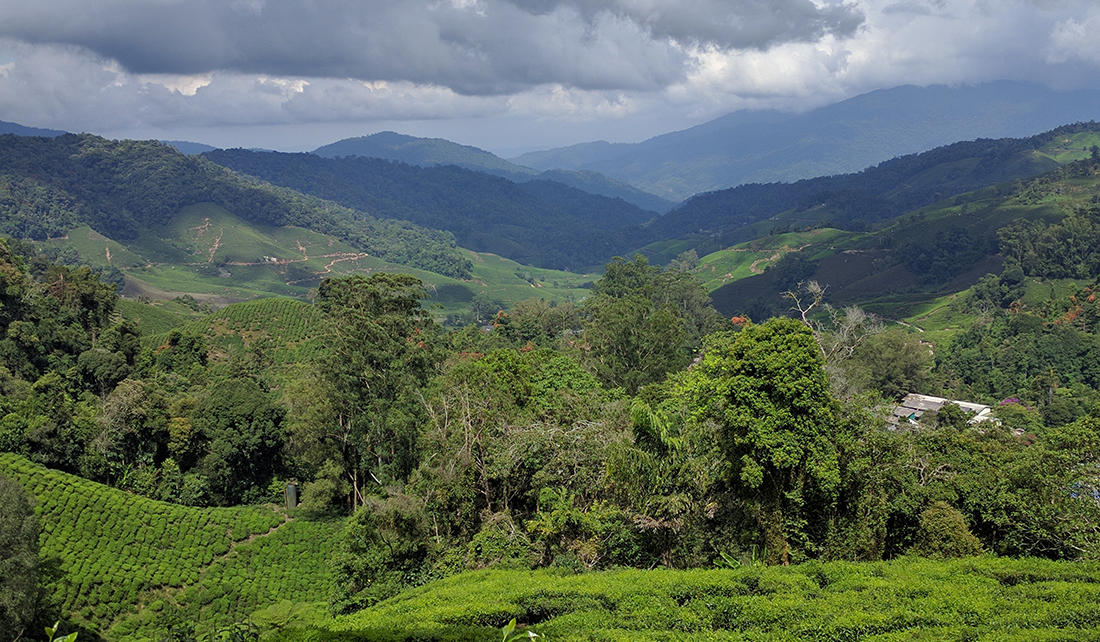
Malaysia tea plantation
The 2016 CCAMLR meeting in Hobart, Tasmania was an exciting meeting to attend. Many of the species I was familiar with from my doctoral work were discussed in terms of conservation or fisheries catch allocation in regions of the Southern Ocean that I was familiar with. One of my largest projects of my fellowship year was drafting a background paper for the U.S. delegation to present to CCAMLR on incorporating independent review of fisheries stock assessments in the CCAMLR convention area.
I was able to be in attendance as a member of the U.S. delegation and see this paper brought to the floor in front of the 24 member nations and the European Union and discussed. The most exciting event to come out of the meeting, however, was the passing and adopting of the Ross Sea Marine Protected Area, a 1.55 million square kilometer section of the Southern Ocean set aside for conservation. This proposal, which is also the world’s largest marine protected area, was six years in the making and its adoption was met with applause, hugs, and tears from the nearly 250 people in attendance at the meeting. It was an emotional and exciting meeting to be a part of.
My fellowship is coming to an end, but I will be continuing my work with NOAA Fisheries as a full-time employee and foreign affairs specialist beginning on January 23. I am so grateful for the experience and training that this fellowship has provided to me this year.
Please visit the Fellowship and Scholarship page for more opportunities.
Illinois-Indiana Sea Grant is a part of University of Illinois Extension and Purdue Extension.
December 19th, 2016 by IISG
My fascination with water began during my childhood. Growing up under strict water conservation measures in Singapore eventually led to working on nutrient loading issues relating to the Illinois River, and finally to my doctoral research on water quality in Alaska.
I brought all this to the Knauss Fellowship placement week in Washington D.C., where I proudly represented the Illinois-Indiana Sea Grant. Placement week started out with a brief overview of the structure of the House and Senate, and the processes involved in creating and passing legislation.
Then came presentations from the 23 host offices, during which I and the other 11 legislative finalists were introduced to the personal offices of various members of Congress from across the country, and House and Senate committees that directly work on legislation concerning the nation’s oceans, atmosphere, and freshwater resources.
Over the next two and a half days, I interviewed with 20 different host offices. While admittedly they were grueling, the interviews were also very rewarding. Through them, I learned about key pieces of legislation that impact much of the freshwater and marine resources I had previously worked on. More importantly, the interviews also enabled me to get to meet some of the incredible people serving in Congress as well as their staff, whose work for the benefit of their constituents is truly remarkable. Getting placed in a congressional office could not have been a better end to placement week for me.
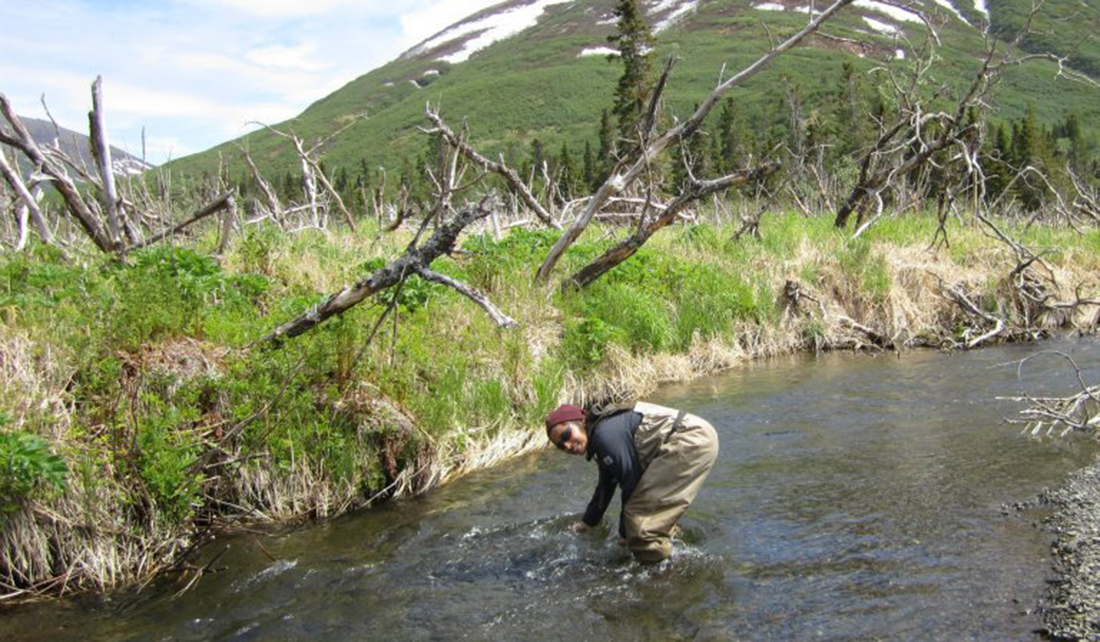
I am very excited to be a 2017 Knauss Fellow in the office of California U.S. Rep. Jared Huffman. I highly respect the path Rep. Huffman took before entering office, and the legislation he has sponsored and co-sponsored since then, especially in regard to natural resources. I look forward to directly assisting Rep. Huffman with his work on the House Committee on Natural Resources, with an emphasis on the Water, Power, and Oceans Subcommittee, which has oversight jurisdiction for NOAA fisheries and coastal issues. I also look forward to working with the committee staff, staff from other congressional offices, representatives from industry, non-profit groups, district field staff, and constituents living in California’s 2nd district.
Additionally, I will serve as the co-director of the bipartisan Congressional Wild Salmon Caucus. Given the grave issues California and the nation are currently facing in terms of water and coastal resources, I am confident that serving as a Knauss Fellow in this office over the next year will teach me a great deal.
Illinois-Indiana Sea Grant is a part of University of Illinois Extension and Purdue Extension.
February 8th, 2016 by IISG
I have always been interested in fish biology, growing up and scuba diving in Massachusetts, but I became interested in fisheries policy through my graduate work at the University of Illinois at Urbana-Champaign.
My doctoral research focused on Antarctic fish physiology, specifically the blood antifreeze proteins that these fishes have in order to survive in the extreme cold temperatures of the Southern Ocean.
My dissertation research showed a link between environmental temperature and antifreeze protein activity and concentration in different, commonly caught fish species in the Antarctic. One of the largest Antarctic fish species which possesses antifreeze proteins is the Antarctic toothfish (also known as the Chilean seabass).
We caught just seven of these fish during my first field season, and I learned about the toothfish fishing industry and the international politics regarding Antarctic resource management which falls under the jurisdiction of the Commission for the Conservation of Antarctic Marine Living Resources (CCAMLR)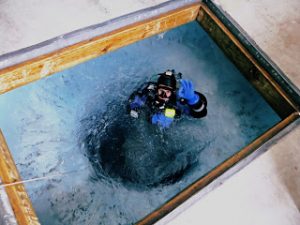 . I wrote grants to study this little-understood fish while at the University of Illinois and tried to learn as much as I could about CCAMLR and the research that goes into making policy decisions.
. I wrote grants to study this little-understood fish while at the University of Illinois and tried to learn as much as I could about CCAMLR and the research that goes into making policy decisions.
I am very excited to be a 2016 Knauss Fellow in the National Marine Fisheries Service Office of International Affairs and Seafood Inspection. I was placed within this office after a grueling but rewarding week of presentations and interviews in Washington, DC. I traveled to DC with 53 other incredible finalists for placement with hosts in the federal government. We heard presentations from the 56 possible host offices on projects ranging from fisheries, satellites, climate change, habitat, and many more. Over the next two and a half days I interviewed with 15 different offices, the majority of which were within NOAA, and by Friday I selected placement in the Office of International Affairs and Seafood Inspection.
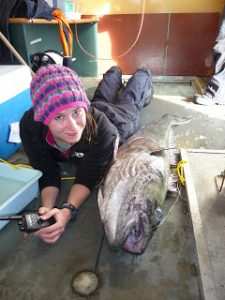 Though I do not know specifically what I will be working on, some of the projects could include the US-Mexico and US-Canada bilateral trade agreements, work with the International Convention for the Conservation of Atlantic Tuna, work with CCAMLR, and fishery bycatch policy. I will have a year of intensive international fisheries policy training where I am sure to learn a lot.
Though I do not know specifically what I will be working on, some of the projects could include the US-Mexico and US-Canada bilateral trade agreements, work with the International Convention for the Conservation of Atlantic Tuna, work with CCAMLR, and fishery bycatch policy. I will have a year of intensive international fisheries policy training where I am sure to learn a lot.
Lauren Fields, University of Illinois’ 2016 Knauss Marine Policy Fellow, received her PhD from the Department of Animal Biology at the University of Illinois in May. She started on February 1, 2016 with NOAA in Maryland.
For more information about the Knauss fellowships and other opportunities, please visit the Fellowship and Scholarship page.

 Hannah Lohman received a bachelor’s degree in civil engineering and a master’s degree in environmental engineering from the University of Illinois Urbana-Champaign (UIUC). She is now working toward a doctorate in environmental engineering with a focus on energy, water, environment and sustainability at UIUC and has completed a Certificate of Excellence in Sustainable Management and Technology from the
Hannah Lohman received a bachelor’s degree in civil engineering and a master’s degree in environmental engineering from the University of Illinois Urbana-Champaign (UIUC). She is now working toward a doctorate in environmental engineering with a focus on energy, water, environment and sustainability at UIUC and has completed a Certificate of Excellence in Sustainable Management and Technology from the  Hannah Staley received a bachelor’s degree in marine science with minors in environmental science and political science from Coastal Carolina University. She is currently a third-year master’s candidate enhancing her public policy skills and broadening her scientific understanding of the environment by pursuing a dual master’s degree in Environmental Science and Public Affairs at the
Hannah Staley received a bachelor’s degree in marine science with minors in environmental science and political science from Coastal Carolina University. She is currently a third-year master’s candidate enhancing her public policy skills and broadening her scientific understanding of the environment by pursuing a dual master’s degree in Environmental Science and Public Affairs at the  Audrey Taylor recently finished her Ph.D. in Earth Sciences at the
Audrey Taylor recently finished her Ph.D. in Earth Sciences at the 








